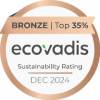To help you build a strong employer brand, we’ve gathered insights from 13 professionals and business leaders on the steps they’re currently taking. From showcasing employees through videos to creating an autonomous workplace culture, discover the strategies these experts are using to enhance their employer brand.
Showcase Employees Through Videos
Sharing employee videos is one step to building our employer brand. These videos allow us to showcase what working at our company is really like and highlight the skills and experience every employee brings to their work daily. They also provide more than just meaningful visuals: they give viewers a glimpse into who we are as an employer behind closed doors—showcasing not just how great it is but why it’s great too!
For instance, videos may include testimonials of current employees and what they love about their job. We share these videos through our website, social media channels, recruitment emails, and other job postings. We also include them in presentations during recruiting events such as job fairs or networking meetings so that potential applicants better understand the workplace environment they could expect when joining our team.
This approach helps us build a strong employer brand and attract top talent who resonate with our values and work environment.
Maria Harutyunyan, Co-founder, Loopex Digital
Embrace Salary and Benefits Transparency
I believe in maintaining total transparency as an employer. Currently, we’re actively publishing our salary and benefits reports, right here in Portland. Our annual reports outline a comprehensive table detailing the positions and their compensations.
On top of that, we also detail our comprehensive benefits package which includes health insurance, retirement plans, and paid time off. We’ve seen a positive response from job seekers who appreciate this straightforwardness. It’s not just about the numbers, it’s about creating an atmosphere of trust, and I truly think this strategy is bolstering our employer brand.
Ben McInerney, Director, Go Tree Quotes

Identify and Promote Your UVP
At the beginning of this year, one of my mentors gave me this two-step process for building my employer brand:
- Determine your UVP (unique value proposition)
- Build your employer brand around this UVP
The first thing my mentor told me was to find my UVP. What do I offer employees that other companies don’t? This could be performance bonuses, wellness programs, office perks, or paid parental leave.
Personally, my UVP is unlimited access to LinkedIn Learning, Masterclass, and Udemy.
Once you’ve identified what makes you stand out, use this to market your job openings. You could discuss it in your job ads and post about it on your social pages.
Scott Lieberman, Owner, Touchdown Money
Implement Strategic Branding Design
As an HR specialist, one key approach I’m implementing to elevate our employer brand is strategic visual branding. For instance, in our London office, we’ve redesigned the workspace to reflect our company culture with vibrant colors and inspirational quotes.
These changes not only enhance the work environment but also create visually appealing content for our social media platforms. We’re seeing the impact of this initiative, with a 20% increase in our LinkedIn followers in the last quarter, indicating greater brand visibility. This, in turn, is helping us attract high-quality B2B partners and job applicants who align with our company values.
Haya Subhan, General Manager, First Aid at Work Course
Leverage Employee Personas
To create a successful employer brand, employee personality development is very important. This fictitious profile provides valuable insight into the background, values, and aspirations of your dream employee and serves as the archetype of your ideal employee.
You can create a reliable and informative persona through thorough research and the use of methods such as surveys and interviews among employees. Discover each individual’s unique qualities and goals, whether in terms of advancement opportunities or work-life balance.
Leverage targeted communication channels such as job postings and social media platforms to tailor your message to different employee segments. Increase employee satisfaction by personalizing benefits and providing relevant educational resources. Fine-tune and update your personas regularly to ensure their relevance. You can build an authentic employer brand that attracts and retains the best talent by leveraging employee personalities.
Bill Lyons, CEO, Griffin Funding

Highlight Remote Work Culture
As the CEO of a remote marketing agency, one key step I’ve been taking is focusing on enhancing our employer brand by spotlighting our remote work culture.
For instance, we’ve recently initiated a monthly series on our social media platforms, such as LinkedIn and Instagram, featuring the diverse, global locales our team members call home. It’s quite fascinating; we have Jessica working from the serene beaches of Bali, while James finds his inspiration in the bustling cityscape of Tokyo.
In total, we’ve got team members hailing from over nine different countries. This not only demonstrates our global perspective but also underscores the flexibility and freedom our remote culture offers, making us an attractive choice for potential employees.
Joe Troyer, CEO and Growth Advisor, Digital Triggers
Invest in Strong, Unified Visuals
I believe that aesthetic components are essential to developing a powerful employer brand. We invest in developing a visually appealing employer brand identity that communicates our culture and values. This includes creating a logo, selecting a color palette, and producing consistent visual assets such as photos, illustrations, and graphics that align with our brand statement.
To establish a unified and identifiable employer brand, these aspects are used across multiple platforms, including our careers website, social media accounts, and recruitment materials.
Timothy Allen, Sr. Corporate Investigator, Corporate Investigation Consulting
Monitor and Engage with Online Reviews
One of the key steps we are currently taking to build our employer brand is investing in online reputation management. This involves actively monitoring and engaging with reviews and feedback on platforms like Glassdoor and Comparably. These sites significantly impact employer branding, as they shape the perception that our target audience, including potential employees, has of our company.
By addressing concerns, showcasing our strengths, and demonstrating our commitment to transparency and continuous improvement, we are able to create a positive image of our organization and attract top talent.
Joe Kevens, Founder and Director of Demand Gen, B2B SaaS Reviews
Value Employees and Address Their Concerns
Your employees are strong potential brand ambassadors, but if they don’t feel valued or empowered, they could hurt your brand. Unhappy workers can harm your brand through social media and open employment sites.
Establish techniques for employee feedback that are simple for all staff to utilize, and encourage them to use them in a public or anonymous way. They are much less likely to grow irritated and seek out alternative outlets for venting if they feel like they have a voice within the organization.
Feedback from employees is helpful, but it’s important to act on it after listening to it. As you compile feedback, you can spot a pattern that points to a communication or company culture issue. Look further into the problem after noticing reoccurring themes, then take action. Inform the staff that you’ve heard their issues and provide details on how the business will handle them. Implement your plan after that, and keep getting feedback to determine if things are getting better.
Joe Li, Managing Director, CheckYa
Is DE&I a Priority for You in 2024?
Make sure you\'re prepped for success with our 2024 ultimate guide to diversity hiring.
Learn moreDefine Your Employer Value Proposition
One of the steps we are currently taking to build our employer brand is defining our employer value proposition (EVP). We want to clearly communicate what makes our organization an attractive place to work. Through research and feedback from our employees, we are identifying the unique aspects of our workplace culture, benefits, growth opportunities, and work environment.
We are crafting a concise EVP statement that effectively communicates the value we offer to potential candidates. This includes highlighting opportunities for growth, a supportive work environment, meaningful work, and rewards and benefits.
Once defined, we will integrate our EVP into recruitment materials, career websites, job postings, and employer branding campaigns. Our goal is to differentiate ourselves and attract candidates who align with our values and are excited about the opportunities we provide.
Irina Poddubnaia, CEO, Founder, TrackMage

Encourage Employee Advocacy
In my opinion, none of us can do a better job of promoting our company than our own employees. We encourage and empower our workers to share their positive work experiences and insights.
Employee referral programs, social media training, and recognition campaigns are among the internal activities we use to foster employee advocacy. We build our employer brand and recruit top talent who trust current employees’ experiences and opinions by amplifying their voices and encouraging them to share their real stories.
Edward Mellett, Co-founder, TestHQ
Foster Diversity and Inclusiveness
Our employer brand includes elements of diversity and inclusiveness. We aggressively support and foster a diverse and inclusive workplace in which people from various backgrounds, experiences, and opinions are welcomed and valued.
We pursue inclusive hiring, form employee resource groups, and offer diversity training and education. We demonstrate our commitment to establishing a supportive and equitable environment for all employees by developing an inclusive culture. This dedication resonates with potential applicants who value diversity and inclusion, contributing to a positive view of the employer brand.
We constantly seek partnerships and cooperation with external organizations and institutions to broaden our reach and strengthen our employer brand. Collaboration with colleges and educational programs to offer internships, fund student events, and engage in career fairs are examples of this.
Tiffany Hafler, Marketing Coordinator, Blockchain Lawyer
Create an Autonomous Workplace Culture
Currently, one of the key initiatives I am undertaking involves the establishment of an autonomous workplace culture within our organization. This strategic approach revolves around prioritizing employee satisfaction, fostering growth and development opportunities, and actively promoting engagement.
I firmly believe that cultivating a robust employer brand is indispensable when it comes to both attracting and retaining exceptional talent. When employees genuinely feel valued and recognized for their contributions, their overall job satisfaction and productivity tend to soar.
By placing a strong emphasis on creating an environment where our employees thrive and experience fulfillment in their roles, we are setting the stage for long-term success. This deliberate focus on fostering a supportive and empowering workplace ensures that we can leverage the full potential of our workforce, leading to enhanced organizational performance and growth.
Richard Kennedy, Managing Director, Arken Digital
Joveo can help you get started with finding the right talent at the time, place, and cost. Request a demo of Joveo solutions today! And follow us on Twitter and LinkedIn for access to insightful, thought-provoking content.















